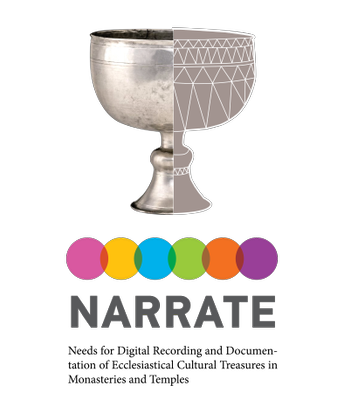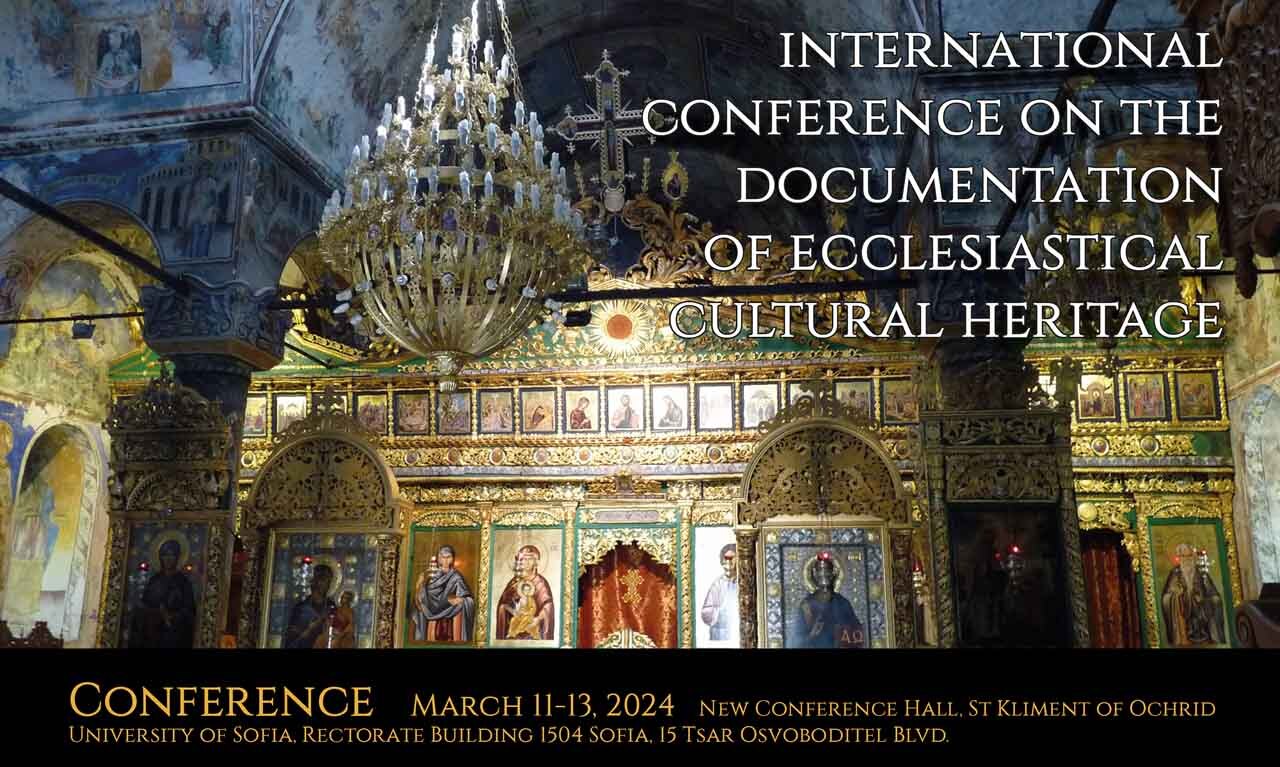
- Best Practices in Digital Documentation.
- User-Centered Design for Digital Documentation Initiatives. Collaborative strategies for defending and preserving cultural heritage at risk.
- Challenges of Documentation of Ecclesiastical Artifacts.
- Digitization Ethics and Cultural Sensitivity. Challenges of the local Ecclesiastical environment.
- Church-historical geography of Thrace. Archaeological discoveries and the conservation of church monuments in Thrace.
- The Future of the Documentation of Ecclesiastical Treasures: Technology, funding and sustainability.
Dates
Location
Call for Papers
Topics
- Best Practices in Digital Documentation.
- User-Centered Design for Digital Documentation Initiatives. Collaborative strategies for defending and preserving cultural heritage at risk.
- Challenges of Documentation of Ecclesiastical Artifacts.
- Digitization Ethics and Cultural Sensitivity. Challenges of the local Ecclesiastical environment.
- Church-historical geography of Thrace. Archaeological discoveries and the conservation of church monuments in Thrace.
- The Future of the Documentation of Ecclesiastical Treasures: Technology, funding and sustainability.
Abstract Submission
Abstract Submission Link:
- Enter the title of your paper
- Enter the abstract (300 to 500 words)
- Add your co-authors (enter their email and their information: First name, Last Name, Organisation and Country of Origin)
- Upload the file of your abstract. You can upload from 1 to 3 files. Maximum file size is 10 Mb. We accept doc, docx, and pdf formats
Guidelines for Authors
Session Types
- Topic 1: Best Practices in Digital Documentation.
- Topic 2: User-Centered Design for Digital Documentation Initiatives. Collaborative strategies for defending and preserving cultural heritage at risk.
- Topic 3: Challenges of Documentation of Ecclesiastical Artifacts.
- Topic 4: Digitization Ethics and Cultural Sensitivity. Challenges of the local Ecclesiastical environment.
- Topic 5: Church-historical geography of Thrace. Archaeological discoveries and the conservation of church monuments in Thrace.
- Topic 6: The Future of the Documentation of Ecclesiastical Treasures: Technology, funding and sustainability.
Poster Presentation
Oral Presentation
Language of the Conference
Schedule
| March 10, 2024 | |
|---|---|
| 19:30 - 21:30 | Welcome Reception – Dinner |
| March 11, 2024 | |
|---|---|
| 09:00 - 09:30 | Registration |
| 09:30 - 10:00 | Opening & Welcome |
| Address to the Conference of His Excellency the Mayor of Sofia Vasil Terziev | |
| Address to the Conference of the Rector of the Sofia University Prof. Georgi Valchev | |
| Address to the Conference of Prof. Efstratios Stylianidis (Aristotle University of Thessaloniki) | |
| Address to the Conference of Prof. Eva Şarlak (Işık University and KMKD) | |
| Address to the Conference of Prof. Stella Sylaiou (International Hellenic University) | |
| 1st Session - Best Practices in Digital DocumentationModerator: Aikaterini Stamou (Aristotle University of Thessaloniki) | |
| 10:00 - 10:40 | Recording and sharing. Challenges of accessibility and ethics for cultural heritage documentation. Efstratios Stylianidis (Aristotle University of Thessaloniki) |
| 10:40 - 11:20 | Documenting Ecclesiastical Cultural Heritage: The Byzart Online Database. Isabella Baldini (University of Bologna) |
| 11:20 - 11:40 | Best Practices for Recovering Texts in Palimpsest Manuscripts Using Multi-Spectral Imaging. Damianos Kasotakis (Early Manuscripts Electronic Library (EMEL)); Roger Easton (Rochester Institute of Technology); Fr. Chrysostomos Nassis (Aristotle University of Thessaloniki); Michael Phelps (Early Manuscripts Electronic Library (EMEL)) |
| 11:40 - 12:00 | Between Visual and Digital: French Example of Digitization and Digitalization of Ecclesiastical Artefacts. Vera Atanasova (National Museum of History, Sofia) |
| 12:00 - 12:30 | Coffee Break |
| 2nd Session - Digitization Ethics and Cultural SensitivityModerator: Fr. Chysostomos Nassis (Aristotle University of Thessaloniki) | |
| 12:30 - 13:00 | Preserving Cultural Legacy with Integrity: Unveiling the Ethics of Art Conservation and Restoration through Icon Conservation and Restoration. Venizelos G. Gavrilakis (VENIS STUDIOS, Istanbul) |
| 13:00 - 13:20 | Ethical Issues from Church Monuments' Digitization. Petros Panagiotopoulos (Aristotle University of Thessaloniki) |
| 13:20 - 13:40 | Ethical problems related to the digitalization of Orthodox Christian heritage. Kostadin Nushev (University of Sofia) |
| 13:40 - 14:00 | Ethics of Digital Representation of Church Treasures. Fr. Emil Paralingov (Holy Metropolis of Plovdiv/Philippopolis) |
| 14:00 - 15:00 | Refreshment & Lunch Break |
| 3rd Session - Monuments in Thrace and Their DigitalizationModerator: Guldehen Kaya (Isik University/KMKD) | |
| 15:00 - 15:40 | Recording and Documentation Needs for the Ecclesiastical Cultural Treasures in Thrace region in Greece. Fr. Chrysostomos Nassis (Aristotle University of Thessaloniki); Georgios Tsigaras (Duth); Ioannis Bakas; Eleni Chrysafi; Aikaterini Stamou; Ioannis Tavantzis; Efstratios Stylianidis (Aristotle University of Thessaloniki) |
| 15:40 - 16:00 | Icons from the Thracian Region at St. Demetrius' Church Collection in Stara Zagora – A Preliminary Announcement. Vanya N. Sapundzhieva; Zornitsa Ivanova (University of Veliko Tyrnovo) |
| 16:00 - 16:20 | Documentation of the Mosaic Pavements of the Byzantine Church at Perinthos-Herakleia in Thrace. Şehrigül Yeşil (Isik University/KMKD) |
| 16:20 - 16:40 | Churches and monasteries in the Bulgarian part of the Strandzha mountain – opportunities for digitization. Ventzyslav Karavalchev (University of Sofia) |
| 16:40 - 17:00 | Athos' Endangered Archives: Digitising, Cataloguing, Translating, and Preserving Ottoman Archival Collections. Vanessa R. de Obaldia (ERC Starting Grant MAMEMS) |
| 19:00 - 22:00 | Social Dinner |
| March 12, 2024 | |
|---|---|
| 08:30 - 09:00 | Registration & Networking |
| 4th Session - Challenges of Documentation and Preservation of Ecclesiastical ArtefactsModerator: Stella Sylaiou (International Hellenic University) | |
| 09:00 - 09:40 | Digitizing Post-Byzantine Religious Inscriptions in Bulgaria. Tsvetan Stefanov Vasilev; Dimitar Iliev (University of Sofia) |
| 09:40 - 10:00 | Damage Assessment for conserving architectural heritage at risk. Emre Kishalı (Kocaeli Univeristy, Department of Architecture) |
| 10:00 - 10:20 | Conservation methodology of polychrome wooden altarpieces in Yeniköy Panagia Orthodox Church in Istanbul. Damla Acar (Cultural Heritage Conservation Learning Community) |
| 10:20 - 10:40 | Balamand Digital Heritage. Hareth Y. Ibrahim (St Joseph of Damascus Manuscript Conservation Centre) |
| 10:40 - 11:00 | 3D Documentation of UNESCO Monument, Church of the Saviour, Thessaloniki, Greece. Zoi Eirini Tsifodimou; Ifigeneia Skalidi; Aikaterini Bakousi; Alex Skondras; Eleni Karachaliou; Ioannis Tavantzis; Thomas Mone; Aikaterini Stamou; Efstratios Stylianidis (Aristotle University of Thessaloniki) |
| 11:00 - 11:30 | Coffee Break in Poster Area |
| 5th Session - The Future of Digital Documentation of Ecclesiastical TreasuresModerator: Svetoslav Ribolov (University of Sofia) | |
| 11:30 - 12:00 | Design of data models and reference ontologies on ecclesiastical domain: the case study of the NARRATE platform. Stella Sylaiou; Konstantinos Evangelidis (International Hellenic University); Argyris Constantinides; Marios Belk (Cognitive UX GmbH) |
| 12:00 - 12:20 | An icon, a site, a book: We and the digital representations of church cultural heritage. Costis Drygianakis (Volos Academy for Theological Studies) |
| 12:20 - 12:40 | Late Antique and Medieval Christian Monuments of Thrace – a need of digitalization. Todor Enchev (University of Veliko Tyrnovo) |
| 12:40 - 13:00 | Overview of suitable platforms for digitisation and description by the end user of cultural artefacts and their presentation to the public. Pencho Mihnev; Atanas Georgiev (University of Sofia) |
| 13:00 - 14:00 | Refreshment & Lunch Break |
| 19:00 - 21:00 | Social Dinner |
| March 13, 2024 | |
|---|---|
| 09:00 - 15:00 | Trip to monasteries in the area around Sofia. Check the Social Events section for more information. |
Keynote Speakers
Venizelos G. Gavrilakis
President of VENIS STUDIOS, Senior Expert Art Conservator Restorer

Venizelos G. Gavrilakis is a highly expert in art conservation and restoration of Byzantine icons, historical paintings, artworks, and antiquities, renowned worldwide for his exceptional expertise. With a strong academic background, Venizelos graduated from a Ministry-certified conservation and restoration faculty in Greece, specializing in art conservation and restoration of artwork and antiquities. He further honed his skills through dedicated studies in paintings restoration and conservation at the prestigious Conservation Fine Art Faculty of Palazzo Spinelli in Florence, Italy. Since 1994, Gavrilakis has served as a senior expert art conservator and restorer, undertaking numerous noteworthy projects across the globe. His remarkable career includes managing director positions at art conservation laboratories in renowned institutions, collaborations with galleries and private collectors. He is an art-writer and contributor to “The World Art News”, Local Approach” and others. Gavrilakis is a member of KMKD Kültürel Mirası Koruma Derneği (Association for the Protection of Cultural Heritage) while also member of AIC, IIC, ICON, ICA and other heritage culture associations. He is owner and president of VENIS STUDIOS, a leading art conservation and restoration company headquartered in Istanbul, Turkey. The studio is dedicated to delivering exceptional services worldwide, combining the science and art of conservation and restoration, ensuring the art preservation of historical artworks and monuments at the highest level of craftsmanship.
Dr. Damla Acar
Conservation Architect

Dr. Damla Acar is a conservation architect, specialized in historic wooden buildings and wooden objects conservation. She is also a specialist on conservation of painted and decorated architectural surfaces. She was a senior conservation architect at National Palaces Directorate in Istanbul till 2022. She is co-founder of Koruma Akademisi (cultural heritage conservation learning community) and is running the conservation of timber altarpieces and timber Templon wall of Yeniköy Panagia Church in Istanbul. She organizes many learning experiences for the mid- career professionals on painted surfaces conservation, timber conservation and icon conservation for Koruma Akademisi.
Dr. Şehrigül YEŞİL
Assist. Prof., Işık Üniversitesi, Turkey
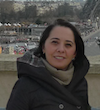
Şehrigül YEŞİL obtained her undergraduate degree from Istanbul University, Department of Conservation and Restoration of Cultural Property and her master's degree from the Classical Archaeology Department of the same university. She received her PhD degree from Istanbul University, Department of Conservation, Renovation and Restoration with a dissertation on the reburial of mosaic pavements for preservation in the ancient city of Perge. YEŞİL has been working as a lecturer and head of programme at FMV Işık University since 2013 and has been working as an Assistant Professor since 2020. She is also a member of the board of the Association for the Protection of Cultural Heritage. She has experience as a field conservator over fifteen different sites in Turkey. Her research activity is mainly focused on documentation, conservation, maintenance programs, and reburial for preservation of mosaics.
Dr. Efstratios Stylianidis
Professor at the School of Spatial Planning and Development of Aristotle University, Greece
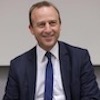
Dr. Efstratios Stylianidis is a Professor at the School of Spatial Planning and Development of Aristotle University, Greece, where he leads the Laboratory of Geoinformatics (LabGeo). During this period (2019-2023) he is acting as Vice Rector for Research and Lifelong Learning. His research focuses on the intersection of Geospatial Sciences and ICT for the benefit of natural and built environment. He is currently the President of the International Committee for Documentation of Cultural Heritage - CIPA (2020-2024) where he will continue to serve as a Vice President for the next four years (2024-2027). CIPA is one of the oldest International Scientific Committees of ICOMOS (International Council of Monuments and Sites), jointly founded in 1968 with ISPRS (International Society of Photogrammetry and Remote Sensing) to facilitate the transfer of technology from the measurements sciences into the heritage documentation and recording disciplines. Dr. Efstratios Stylianidis was a visiting Professor at Columbia University (2018), while as an invited speaker he gave lectures at Columbia University, Princeton University, and University of California Los Angeles (UCLA).
Dr. Todor Enchev Todorov
Assist. Prof. of Christian Archaeology and Art at the Faculty of Theology and the Faculty of History, University of Veliko Tarnovo, Bulgaria

Todor Enchev Todorov received his BA in Theology (1996) from Sts Cyril and Methodius University of Veliko Tarnovo. He pursued Master’s degree in Theology at the Kapodistrian University of Athens, Greece (2003) and did his PhD in Archaeology in the University of Veliko Tarnovo (2016). He is an Assist. Prof. of Christian Archaeology and Art at the Faculty of Theology and the Faculty of History, University of Veliko Tarnovo and Vice-president of the EIKONA – a group of academics working in the field of ecclesiastical arts from Bulgaria, Romania, Serbia, Macedonia, Greece and Russia, initiated by Prof. George Kordis. Since 2001, he participated in archaeological excavations at the mediaeval monasteries in Bulgaria. His research interests are in the field of early Christian art and archeology, and history of Christian art and he has numerous publications and translations from Greek language.
Dr. Pencho Mihnev
Senior lecturer, Sofia University "St. Kliment Ohridski", Bulgaria

Pencho Mihnev, PhD, Faculty of Mathematics and Informatics, Sofia University "St. Kliment Ohridski", is a senior lecturer in e-learning. He works in the fields of e-Learning (planning, design, development, delivery, assessment and evaluation), Technology Enhanced Learning, Instructional Design, and Curriculum Design. He has more than 70 publications in international sources, and participated in more than 25 R&D and innovative international projects. He obtained MSc degree in Mathematics (Plovdiv University, Bulgaria), one-year specialisation in Computer Science (Sofia University, Bulgaria), and MSc degree in Educational and Training Systems Design (University of Twente, The Netherlands). His career path includes teaching of Mathematics and Computer Science, and Headmaster position at secondary school, Expert in ICT and head of department at the Ministry of Education and Science of Bulgaria, project officer and project manager positions at Sofia University and in private companies, teaching and research positions at Sofia University "St. Kliment Ohridski".
Dr. Vanya Sapundzhieva
Assoc. Prof. of Icon Painting at the Department of Church Arts, Orthodox Theological Faculty, University of Veliko Tarnovo, Bulgaria

Vanya Sapundzhieva, born 1974 in Dimitrovgrad, Bulgaria. Vanya Sapundzhieva finished the National Aprilov High School in Gabrovo (1993) and received her BA and MA in Iconography (1998) from Sts Cyril and Methodius University of Veliko Tarnovo where she also did her PhD in Iconography (2008). She carried out a postdoctoral project at the National Science Fund (NSF) in cooperation with the Aristotle University of Thessaloniki (2010–2013). Vanya Sapundzhieva is Assoc. Prof. of Icon Painting at the Department of Church Arts, Orthodox Theological Faculty, University of Veliko Tarnovo. She is a founder member of the EIKONA – a group of academics working in the field of ecclesiastical arts from Bulgaria, Romania, Serbia, Macedonia, Greece and Russia, initiated by Prof. George Kordis. Since 1997, she has participated in iconographic exhibitions held in Bulgaria, Switzerland, Belgium, Romania, France, Luxembourg, Greece, Poland. Some of her most important projects in the area of Christian art include the frescoes of St. Nicholas Church, Weiler-la-Tour, Luxembourg (2011), the frescoes of St Paisios of Hilandar Church, Stara Zagora, Bulgaria (2004-13), St Michael the Archangel Church, Kolena, Bulgaria (2014-16), Anonsiation Chapel, Stara Zagora (2017), the icons of the same church, St. George Church, Cherni Osam (2021,2023), Bulgaria, icons for the iconostasis of St Haralambos Church, Dolna Mahala, Plovdiv, Bulgaria, iconostasis panels for St Patriarch Evtimii Church, Paris, France and many individual frescoes for churches in Bulgaria. Icons drawn by Vanya Sapundzhieva are also found in many private collections in Europe and the USA. Vanya Sapundzhieva has taken part in two international icon-painting workshops in Brancoveanu Monastery (1998) and in Bistrica Monastery, Romania (2000); in the First, Third, and Fourth Symposium on iconographic art organized by the EIKONA Group held in Thessaloniki, Greece (2009) , St Petersburg, Russia ( 2010) and the Monastery of New Valaam (2011), Finland, respectively; in the Third Biennale 'From Assumption to the Present Day' held at the Institut de théologie orthodoxe Saint-Serge, Paris, France (2009), International atelier "Ikona Nova", Bucharest, Romania (2014) and from the First to the Eight Biennale of Church Arts held in Veliko Tarnovo, Bulgaria (2009-2023). In the period 2011-2023 she is a curator and participant of 10 exhibitions of icons organized jointly with the Bulgarian Orthodox Church Municipality in Paris at the Bulgarian Cultural Institute there in. She has one monograph and numerous publications on post-Byzantine art and in the field of Christian iconology.
Dr. Dimitar Iliev

Dimitar Iliev holds a PhD in Classics (Late antique poetry) and an MA in Computer Linguistics and Humanities Computing from the University of Sofia. His main scholarly interests range from the linguistic analysis of Ancient Greek poetry and the interaction of religions and cultures in Late Antiquity to the digital publication of ancient epigraphic monuments and other textual sources using TEI XML. He has been a guest lecturer and a workshop tutor at the Universities of Cologne, Belgrade, and Tbilisi. He is the coordinator and the encoding supervisor for the ORASIS collection of Post-Byzantine church murals from Bulgaria.
Dr. Tsvetan Vasilev
Assoc. Prof. of Classics in the University of Sofia, Bulgaria
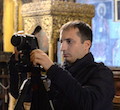
Tsvetan Vasilev holds a PhD in Classics (Koine Greek language) and is currently an Associate Professor of Classics in the University of Sofia. His scholarly interests are in the field of Post-Byzantine inscriptions in Greek language and Neolatin studies. He has been a guest lecturer in the University of Cologne and has participated in scientific projects concerning the epigraphic heritage of Bulgaria and the Balkans. Together with Dimitar Iliev has been working upon the ORASIS project – a digital edition of Post-Byzantine inscriptions from Bulgaria.
Important Dates
Time zone: Anywhere on Earth (AoE)
Sponsors


